As he walked out of his room to meet Malaysiakini, nine-year-old Andy's pale, translucent complexion, emaciated body, and laboured movements reflected the many years of bureaucratic processes that denied him access to affordable medical care to manage his HIV infection.
Prenatally infected, Andy (not his real name) was happy to receive guests and even more the sour candy he quickly finished. His lack of schooling owing to his statelessness was the least of the family’s worries.
When met, Andy was struggling to fully recover from a serious bout of infections that took him to the brink of death last year and left the family RM40,000 in debt with the Lahad Datu Hospital, on the east coast of Sabah.
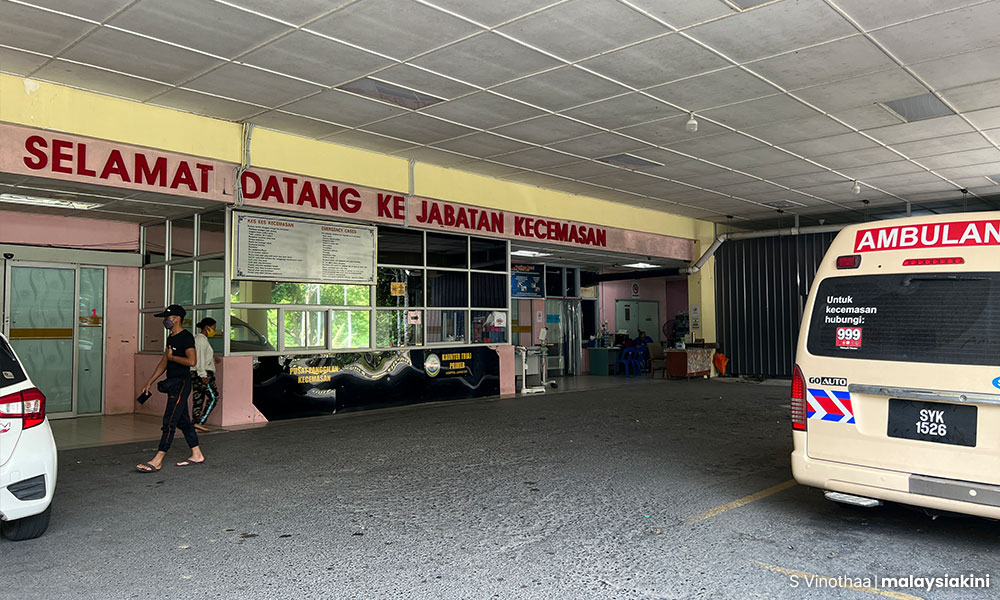
Skipping or delaying HIV treatment weakens the immune system - which increases susceptibility to disorders of the immune system and developing AIDS.
Because he was stateless, the Lahad Datu Hospital, closest to where he lives, wanted to charge Andy a “foreigners fee” for the medication to manage the HIV infection.
His family couldn't afford it, so he was deprived of life-saving drugs for years, until he fell seriously ill last year.
Andy was admitted to the Likas Pediatric and Maternity Hospital, some 400km from home, and this hospital pledged one-year free treatment and drugs to be dispensed via the Lahad Datu Hospital.
But to access this, he still relied on the Lahad Datu Hospital to waive the high registration fee for non-citizens.
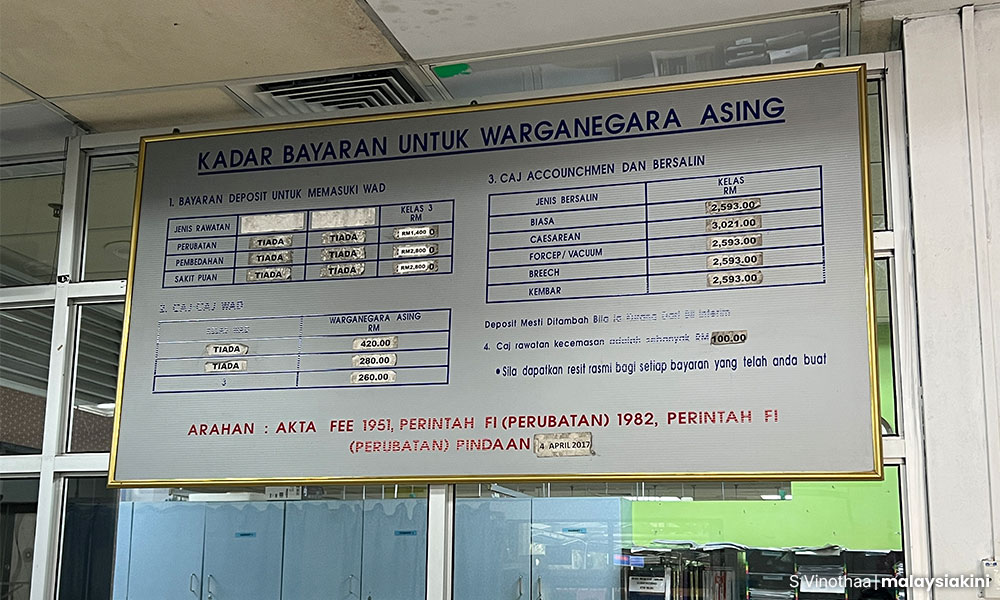
His maternal grandmother, his sole caretaker, pawned jewellery, begged, and borrowed so he could be treated but on April 12, he died.
“I had nothing else to sell or pawn,” she said between sobs.
Despite being born in Malaysia to a Malaysian parent just nine years before, Andy died stateless. He died several months after Malaysiakini met him.
Andy’s struggles as a stateless person to access medical care epitomised the selective bureaucracy in the state’s registration department - which is ironically reputed to have artificially altered the electoral demography by providing citizenship for votes to thousands of immigrants to oust its ruling party that took the state in 1985.
Often, his elderly maternal grandmother found herself at her wits’ end just trying to get past the first hurdle a stateless patient has to cross before consultation with a medical official - the RM120 outpatient registration fee for every visit. A citizen only pays RM5.
READ MORE: Baby snatching: How stateless mums lose their infants at Sabah hospital
At every visit, she said, the hospital’s Revenue Department also demanded that she top that up with instalments toward settling the previous bill of RM40,000, incurred before the Likas Hospital pledge.
“I needed RM200 every two weeks. The outpatient registration fee is RM120 and RM50 was toward the outstanding owed to the hospital.
“I needed an additional RM30 for travel by taxi because there is no reliable public transportation near our home and I bought us a meal with the balance,” said the grandmother, who declined to be identified fearing stigma against her family from neighbours, who do not know Andy died of HIV/AIDS.
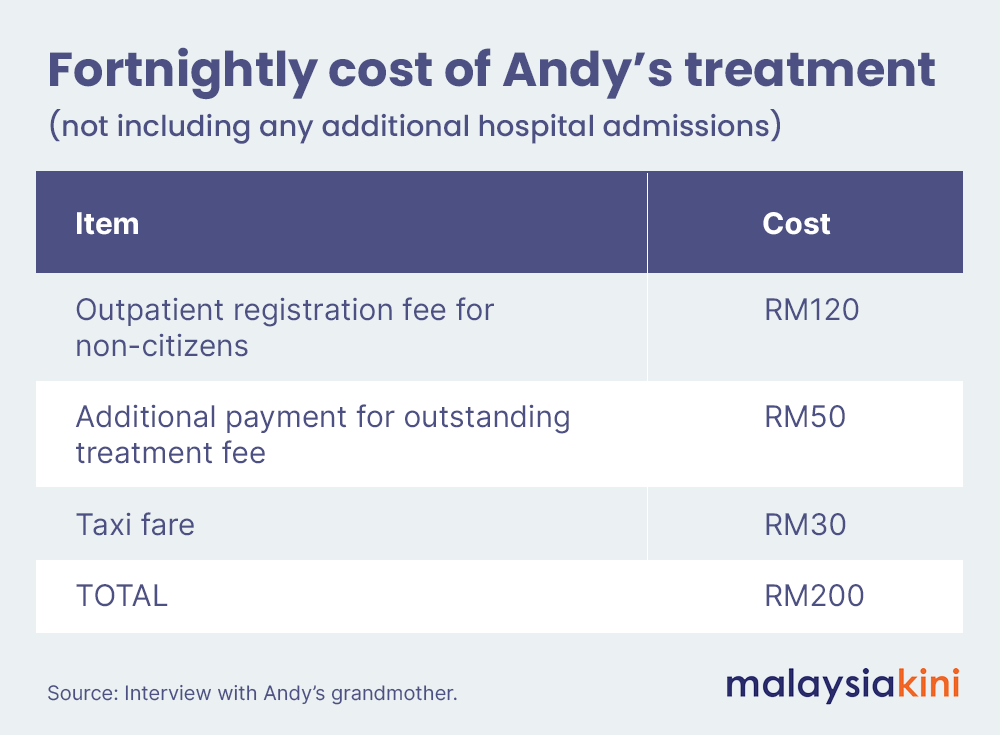
Even though she was chipping away at the remaining RM800 or so instalments, hospital visits sometimes turned ugly, when the person behind the Revenue Department counter demanded more money from the helpless grandmother.
“The first time they asked for more to clear the outstanding bill, I borrowed from a relative and pawned my gold ring.
“The second time, I found myself crying because I had no one to turn to and they refused to let my grandson see the doctor if I didn’t give them RM500 instead of the usual RM50 extra.
“Day had turned into night. With no solution in hand, we were fortunate as there were some doctors who used their discretion to forgo the registration fee and examine Andy before dispensing the batch of treatment,” she said.
Speaking to Malaysiakini after Andy’s demise, she said their trips to the hospital became irregular because of the hospital’s high demands. She believes this led to Andy’s health deteriorating.
“I don’t know what caused his death because I don't understand the English words they use to describe his condition,” she said.
Andy had spent a week in the hospital before he passed away.
Since his passing, the hospital has not made any demands for the outstanding payments or the bill for Andy’s latest hospitalisation to be settled.
Citizenship bureaucracy delayed treatment
The issue of statelessness isn’t always cut and dry. In several Sabahan families met by Malaysiakini, some siblings from the same parents are citizens while others are considered foreign.
The reasons are often uncompromising bureaucracy, which has a compounding effect on every spectrum of their lives, pushing them to the brink and sometimes leading to their tragic death.
The struggles of Andy’s mother match the findings reported by the All-Party Parliamentary Group Malaysia on Sustainable Development Goals (APPGM-SDG) in 2021, which found that single unwed mums of stateless children were excluded from welfare services for single mothers. Single mothers are often assumed to be widows.
The children are also not allowed to enrol in public schools.
Andy's treatment delay is rooted in the fact that he was unable to prove his citizenship, even though his grandparents, aunts, and uncles are Malaysians.
His mother is the only one of her siblings who is stateless, despite her birth certificate stating she is Malaysian.
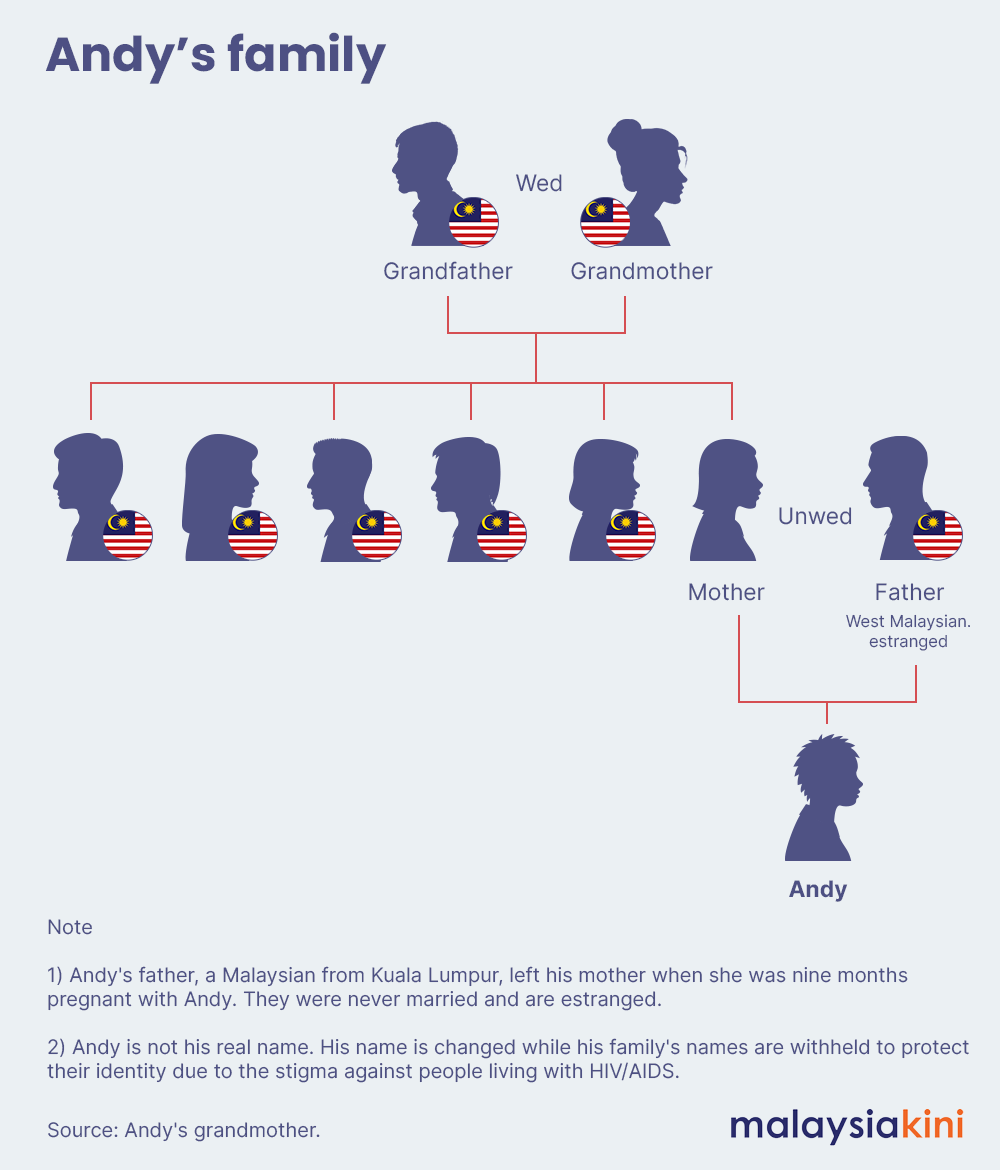
When she applied for a MyKad in her teens - several years after the age of 12, when Malaysians must apply for the MyKad - she was told by the National Registration Department that she was too late.
Her ongoing attempts to obtain a MyKad in adulthood have been hampered by bureaucracy, and her citizenship was in question because there was a discrepancy over the spelling of her father’s name on her birth certificate.
Andy’s parents did not register their marriage, and his father, a Malaysian from Kuala Lumpur, is no longer in the picture. Without his parents' marriage certificate, Andy was denied citizenship.
His mother had attempted again to get a MyKad, after her son's diagnosis, in hopes it would help Andy receive his full treatment.
But her appointment to collect her revised birth certificate later was too late to make a difference in Andy's life.
She was not available to speak to Malaysiakini.
Indigenous community treated like intruders
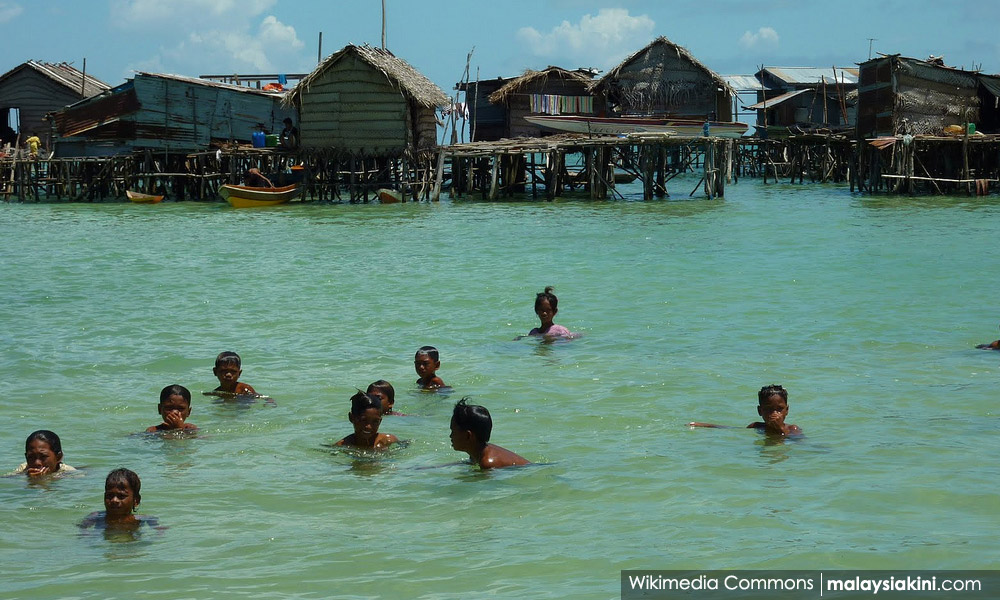
The Bajau Laut are known for their picturesque, sea-dwelling lifestyle that floods social media platforms with holidaymakers’ snapshots of skinny, tanned children frolicking in beautiful turquoise waters, depicting a carefree life, void of want or worry.
But Malaysiakini’s visit to their villages reveals a different scene - there, children leapt from dilapidated shed-like houses, standing in dark, filthy waters.
Still, their unmistakable carefree smiles continue to tug at the heartstrings.
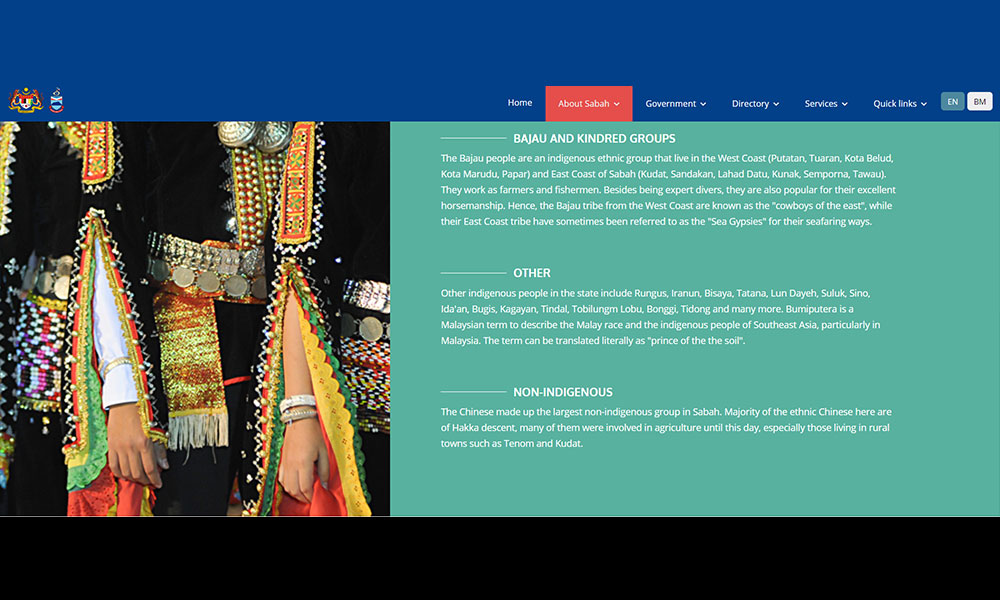
Despite being recognised by the Sabah government as seafaring indigenous people of the state, most of the Bajau Laut community are stateless by law and are often hounded by the Immigration Department for being “illegal immigrants”.
In late 2020, at the height of the pandemic, the respective national human rights institutions from Indonesia, Philippines, and Malaysia’s Suhakam concurred that nationality laws and immigration laws perpetuated statelessness in Sabah.
The respective countries’ human rights commissions signed a 17-month tripartite memorandum of understanding (MoU) on the Statelessness Issue in Sabah, earlier that year.
However, Covid-19 restrictions impeded their plans to hold discussions with relevant government agencies, Suhakam said in its 2020 annual report, tabled in Parliament in June this year.
On Sept 7, in the district of Semporna where most of the Bajau Laut settlements are located, the three agencies signed an agreement renewing their commitment to improve the situation for stateless persons and those at risk of statelessness in Sabah.
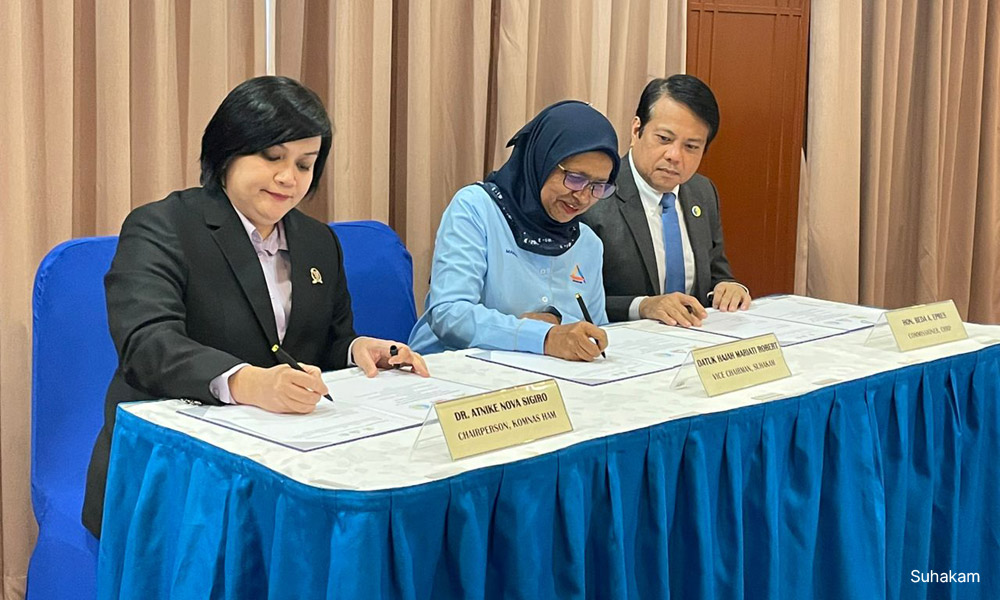
‘Payment first’ rule for the stateless
Malaysiakini spoke to multiple medical officers from various parts of Sabah on the matter of statelessness and medical access.
They spoke anonymously because as civil servants, they are not allowed to speak to the media without authorisation.
In Sabah, they said, Lahad Datu Hospital is the most zealous in imposing this rule on collecting upfront fees on the Bajau Laut and other stateless persons.
The role of the hospital Revenue Department is to collect payments from patients but it is a growing concern among observers and medical officials who spoke to Malaysiakini that the Lahad Datu Hospital practised very little discretion in demanding payments from the stateless who do not have the means.
The medical officers in that hospital said they are also under scrutiny by the Revenue Department about this.
“We have been lectured by them (the Revenue Department) again and again and their focus was getting payments first,” one medical officer said.
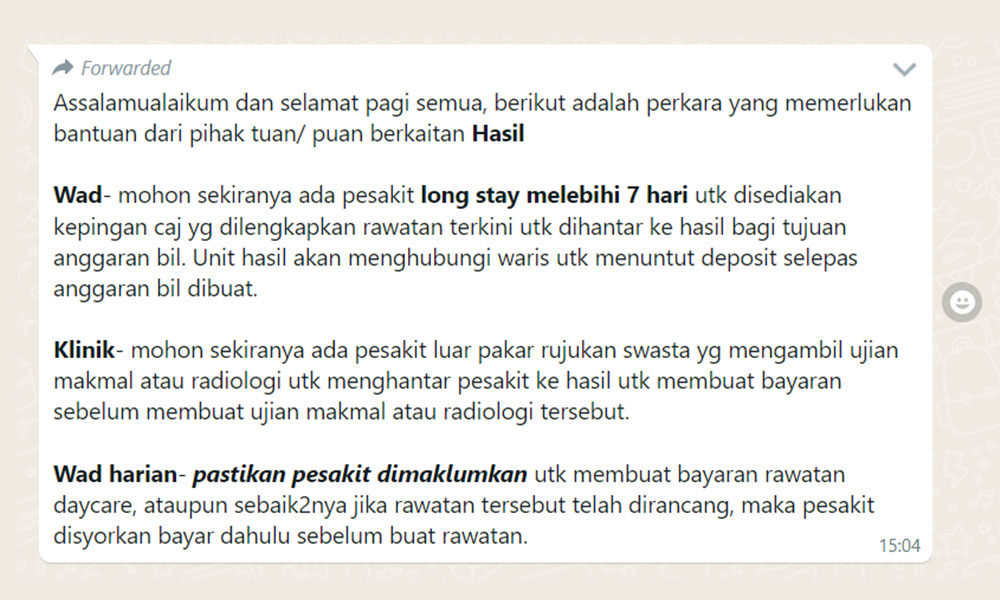
The healthcare professionals say they try their best to provide treatment as soon as possible, registration fee aside, but this is only possible when patients arrive at the emergency department in critical condition.
In such cases, one medical officer said, the critical patients are placed in the Red Zone for immediate treatment and tests without the need for upfront fees.
However, once the patient is cleared by the emergency department, they will face harassment to pay, either when discharged or admitted into the ward.
Another Lahad Datu Hospital medical officer said patients have also been sent home if they cannot afford the upfront fees for diagnostic tests, including primary tests like blood and urine tests.
Having worked in various tertiary and district hospitals in Sabah, one medical officer said the Lahad Datu Hospital is the strictest in enforcing the “payment first” rule.
Other medical officers from several other tertiary hospitals and district hospitals agreed.
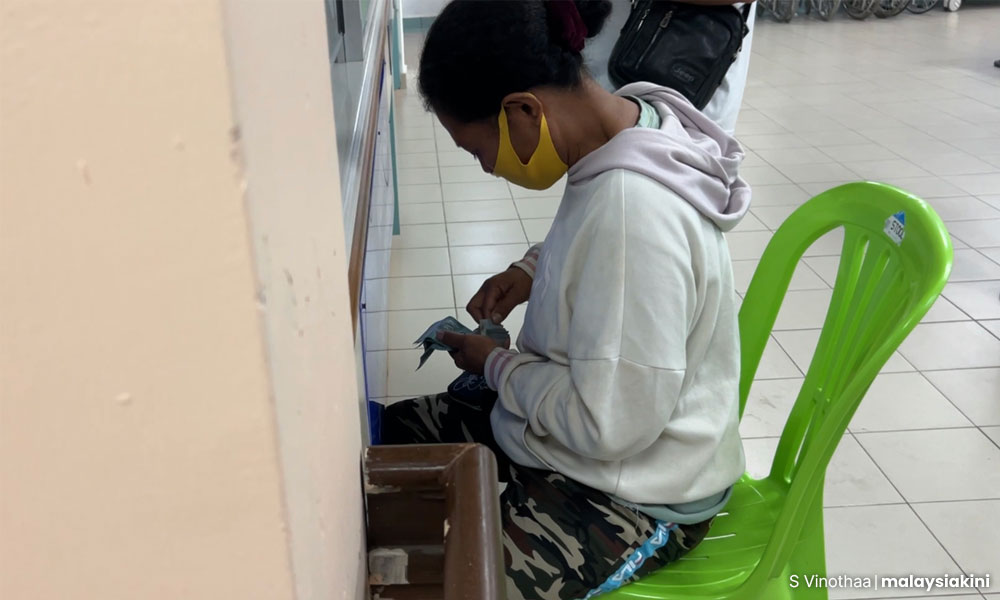
For example, in the Kuala Penyu district hospital, Malaysiakini learnt, patients are allowed to work out a deal to pay in instalments after being discharged. Doctors there also try to discharge the patients quickly to avoid a higher financial burden.
Even so, a medical officer there said, undocumented patients often come after they have tried to treat their ailments with traditional medicines, sometimes causing more harm.
What ministry circulars say
The various ministry circulars addressing fee structures for foreign nationals seeking treatment in public hospitals started in 2014.
However, a 2001 Sabah Health Department circular compels medical officers to report to the police when an undocumented migrant sought treatment and refers to the influx of migrants to Malaysia as a “threat to national security”.
Circulars starting in 2014 state that all efforts must be made by hospital staff to collect unpaid deposits from foreign patients leaving the Red Zone in the emergency department.
However, none explicitly state that the same should apply to the stateless or undocumented persons in the country or directly address the stateless, often referred to by medical officers as “UR” or “unregistered”.
Neither do the Medical Fee (Amendment) Orders 2014 gazetted the same year, which brought the new fees format into force.
On the ground, the stateless are considered foreigners and several circulars empower the hospital’s Revenue Department to seek cooperation from ward staff to do “everything in their power” to recover payments from foreigners.
One circular signed off by the Health Ministry’s finance department instructs hospitals to intercept patients leaving the emergency department for a registration fee and admission deposit.
It also instructs the Revenue Department to seek ward staff assistance to withhold medication pending payment and for security staff to ensure no patient absconds before settling their bills.
Hospitals are also guided to obtain contact details of the patient’s next of kin for this purpose.
The RM120 outpatient clinic fee entitles the patient to only five days’ worth of medication, regardless of their condition. The fee also does not cover tests.
If they need more medication, they have to purchase it at a private pharmacy.
However, the stateless community could barely afford the RM120 fee and most are unable to complete their treatment to recover fully.
Prolonging suffering among children
Seven-year-old Maimunnah was among stateless children in Lahad Datu who were forced to wait until her condition was critical, before receiving medical attention.
By the time a medical official spotted her at the Lahad Datu dumpsite, where her family lives and works, her neck, chest and upper back had ballooned and filled with pus.
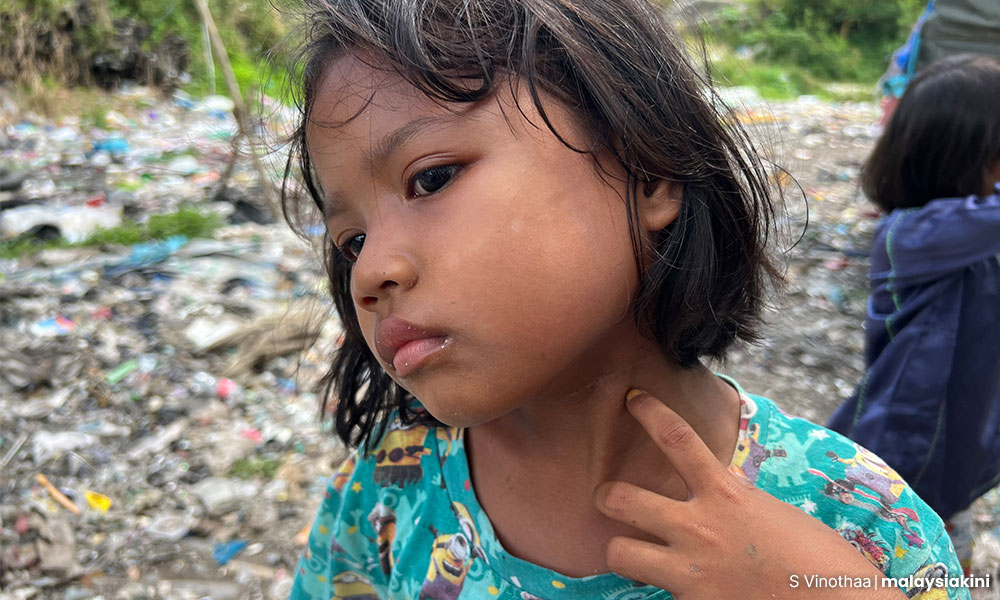
Her mother, Mariam, 24, who makes RM100 a month selling scraps salvaged from the dumpsite, did not have the means to get her medical help.
It was only upon the medical official’s insistence that she took Maimunnah to the hospital. By then, sepsis had set in, and she was diagnosed with life-threatening Retropharyngeal abscesses (a type of infection).
Her condition was so severe that she was sent to Tawau Hospital in an ambulance for surgery to drain the pus-filled abscess.
Her registration fee at the Lahad Datu Hospital was temporarily waived, given her condition, but the hospital demanded RM200 for an RTK-Ag Covid-19 test before she could leave for Tawau in an ambulance.
It was a well-wisher who settled the bill which would have otherwise cost RM4 for a self-test kit bought at a local pharmacy.
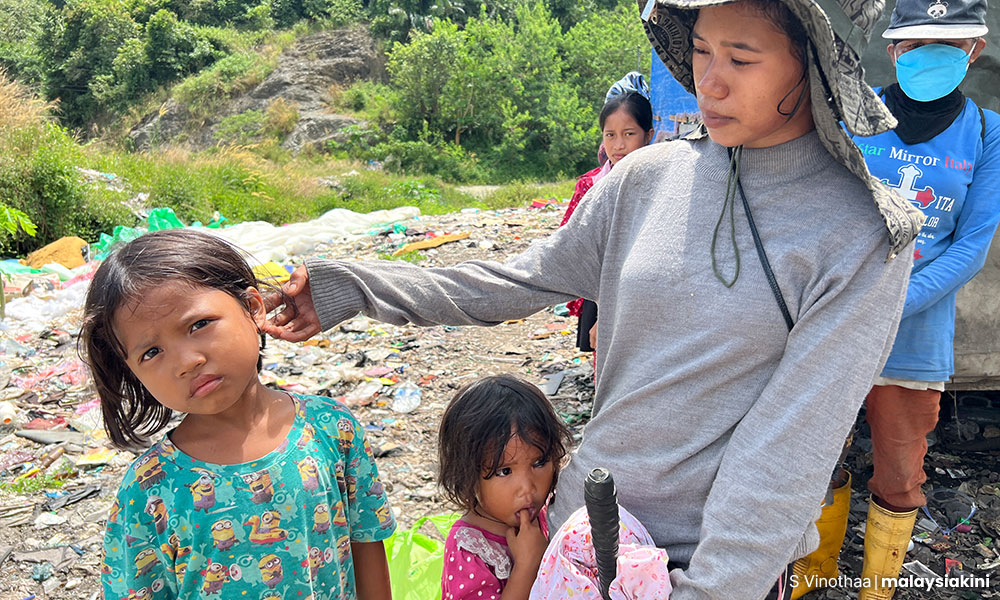
Tawau Hospital exempted her from payment and provided her with a signed waiver so she could recover at Lahad Datu Hospital without paying.
While relieved by her recovery, her parents fear she may fall ill again, and next time, they won’t be so lucky.
“I can only afford to buy rice, diapers, and baby formula for my youngest child,” Mariam said.
When contacted, the then Sabah Health director Dr Rose Nani confirmed receiving Malaysiakini’s questions on the matter and that the ministry’s corporate communications department will respond.
Suhakam Commissioner Mariati Robert too had visited the hospital and the Bajau Laut water villages but the commission has declined to provide a statement until its investigation into allegations of human rights abuses concluded. - Mkini
This article is Part 2 of a five-part Malaysia Day series on the issue of statelessness in the country.



No comments:
Post a Comment
Note: Only a member of this blog may post a comment.